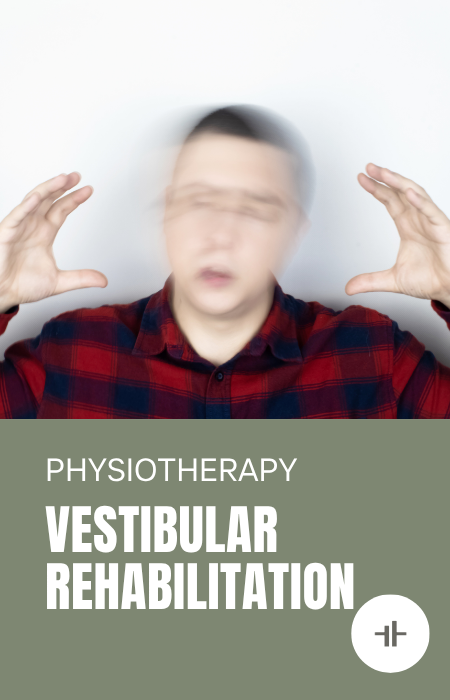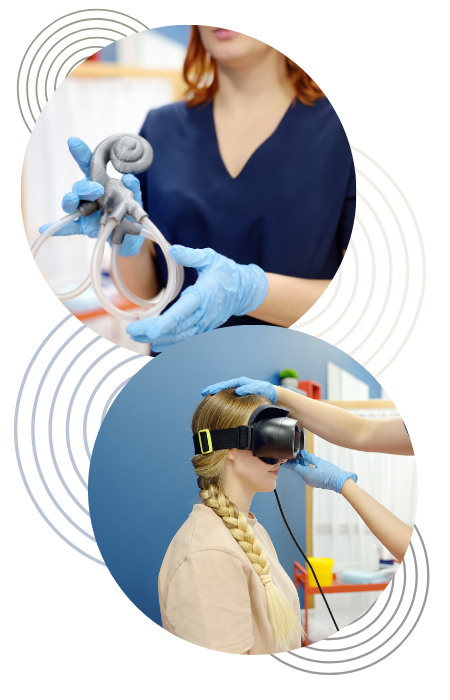Let's Get You Moving Again — Reclaim Your Mobility
- Direct Billing with ICBC and Major Insurance ProvidersExpert guided Personalized Treatment Plans
Vestibular Rehabilitation in Burnaby - Regain Your Balance with Vestibular Therapy
Does sudden dizziness or a spinning sensation disrupt your daily activities? Our specialized vestibular rehabilitation program has helped patients in the Burnaby community overcome vertigo and balance disorders within just 4-6 sessions, using proven vestibular physiotherapy techniques that target the source of your symptoms, not just temporary relief.

Vestibular Rehabilitation
What is Vestibular Therapy and How Does It Help?
Vestibular Rehabilitation is a specialized form of physiotherapy designed to retrain your brain's connection with your inner ear balance system. This treatment helps your central nervous system compensate for vestibular deficits through specific movement patterns and vestibular exercises. Studies show patients with balance issues who undergo vestibular rehabilitation therapy experience improved balance, reduced dizziness and decreased fall risk.
The vestibular system in your inner ear works like your body's internal GPS, constantly sending signals about your position and movements to your brain. When vestibular dysfunction occurs due to injury, infection, or age-related changes, you experience symptoms like:
- Vertigo (spinning sensation) that worsens with head movements
- Persistent dizziness or lightheadedness throughout the day
- Loss of balance, especially in crowded spaces or darkness
Unlike medication that masks symptoms, vestibular rehabilitation addresses the root cause by promoting neuroplasticity - your brain's remarkable ability to form new neural connections and adapt to changes in sensory input from the vestibular, visual, and somatosensory systems.
Vestibular Rehabilitation
When Should You Consider Vestibular Rehabilitation Exercises?
Navigating everything from SkyTrain platforms to hiking trails at Burnaby Mountain - activities that become challenging when dealing with vestibular disorders. With Burnaby's population maintaining an active lifestyle, addressing balance issues quickly becomes essential for participating in daily physical activities.
You should seek vestibular rehabilitation if you experience:
Positional vertigo triggered by specific movements - Rolling over in bed, looking up at grocery store shelves, or bending down causes dizziness. This often indicates a peripheral vestibular disorder like BPPV, which responds exceptionally well to treatment.
Persistent imbalance after infections or injuries - Following vestibular neuritis, labyrinthitis, or head trauma common on busy corridors, your balance system may need targeted rehabilitation exercises to achieve vestibular compensation.
Difficulty with eye movements and visual stability - Struggling to read while walking or experiencing blurred vision during head movements indicates vestibular hypofunction requiring specialized exercises to restore gaze stability.


Vestibular Rehabilitation
How Does Vestibular Rehabilitation Work for Different Disorders?
Vestibular rehabilitation addresses both peripheral vestibular and central vestibular disorders through evidence-based treatment protocols. Whether dealing with a vestibular lesion from infection or chronic vestibular dysfunction, our physiotherapy approach targets the specific mechanisms of recovery.
The Science Behind Vestibular Compensation
Physical therapy for vestibular rehabilitation uses three primary mechanisms:
- Adaptation - Through repetitive eye and head movement exercises, patients retrain their vestibular system to correctly process signals
- Substitution - Visual and somatosensory systems strengthen to compensate for vestibular hypofunction
- Habituation - Gradual exposure to symptom-triggering movements reduces sensitivity
Treatment Approaches by Condition
For peripheral vestibular disorders like BPPV, vestibular rehabilitation treatment often involves canalith repositioning maneuvers that can resolve vertigo in 1-3 sessions. Central vestibular lesions typically require longer rehabilitation, with patients needing 8-12 weeks of consistent vestibular exercises to achieve optimal outcomes.
Vestibular neuritis and other causes of acute vestibular hypofunction respond well to intensive vestibular rehab programs that progressively challenge balance and promote compensation. Even chronic vestibular dysfunction from Meniere's disease benefits from ongoing therapy to manage symptoms and maintain function.
Why Choose BLVD for Vestibular Rehabilitation
BLVD Wellness and Recovery is your go-to provider for vestibular rehabilitation in Burnaby. Our clinic is equipped with expert physical therapist for diagnosing vestibular deficits and restoring postural stability. Patients benefit from evidence-based methods, skilled therapists, and a convenient location. We use gaze stabilization, habituation exercises, and balance retraining to help you recover from vestibular disorders with confidence and clarity.
FAQs
Which vestibular disorders benefit most from physiotherapy?
How do rehabilitation exercises reduce dizziness and improve balance?
What's involved in a typical vestibular physiotherapy session?
Direct Billing with Major Extended Health Benefits Plans



.svg.avif)








Tuesday
Wednesday
Thursday
Friday
Saturday
Sunday
7:00 am to 7:00 pm
7:00 am to 7:00 pm
7:00 am to 7:00 pm
7:00 am to 7:00 pm
7:00 am to 7:00 pm
Closed
Other services
Communities We Serve

